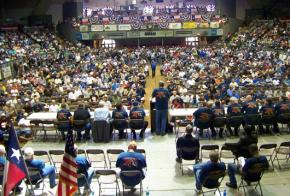High stakes at Lockheed
and report on the stakes in an IAM strike in Texas.
SOME 3,650 members of International Association of Machinists and Aerospace Workers (IAM) Lodge 776 are on strike against aerospace giant Lockheed Martin after workers voted down the company's "best and final offer" by an overwhelming margin.
The strike involves workers at Lockheed's Fort Worth, Texas, plant--which produces state-of-the-art military aircraft, including the new F-35 Joint Strike Fighter, currently the Pentagon's most expensive weapons program--and two military airfields where Lockheed planes are tested.
The main issues in the strike are pensions and health insurance. Lockheed Martin wants to shortchange new workers by eliminating a defined-benefits plan for new hires. IAM members recognize this as a way to divide the rank and file and a step toward getting rid of pensions for all workers.
"[First,] they take away pension for new hires," IAM spokesperson Bob Woods told In These Times. "Next time around, when new hires [are in the union], they say, 'We're going to freeze the pension.' Of course, the new hires that don't have a pension aren't going to strike, so then the pension is frozen."

Health insurance is another issue. Lockheed wants to shift union members into LM Healthworks, a high-cost, high deductible plan. Workers on the picket line say this is a brazen attempt to take money earmarked for health care in government contracts.
According to one IAM member, Lockheed's government contracts set wages and benefits, with the money earmarked for health insurance adding up to around $1,600 to $1,700 a month per worker. By shifting employees into its Healthworks program, the company gets the cost it pays for coverage down to around $420 a month--and basically pockets the rest.
Picketers said that salaried employees at Lockheed have already been shifted into Healthworks. "We hear about what it's like," said one. "We were told by one supervisor, 'It's not that bad if you don't get sick.'"
ACCORDING TO Lodge 776 President Paul Black, the company's "best and final offer" was not very different from what it proposed a year ago. Black said Lockheed's negotiating tactics consisted of ignoring union counter-offers and allowing the clock to tick down until the contract expired and the union was forced to accept the concessions or go on strike.
But union members didn't blink. The votes in favor of rejecting the contract offer and striking were both over 90 percent.
As Black pointed out, the vote was not only about defending current workers' benefits, but those of future workers. "We enjoy these pensions because someone before us fought for them," Black said. "I'll be damned if I let them take it away because [the new hires] aren't here yet."
IAM members at Lockheed have gone on strike twice in the last dozen years. Workers spent two to three weeks in those cases, but workers believe this conflict could last longer. One woman on the picket line said she had been saving money for some time in anticipation of the financial hardships that would come with a long strike.
Nevertheless, union members feel they are in a strong position. Lockheed claims it will continue building planes during the strike, using salaried employees, but IAM members say that after previous walkouts, they had to go back and fix mistakes made on the production line while they were gone. "They could try to bring in scabs, but this is the most advanced aircraft in the world," said Wood. "The skills of these workers out here are second to none. All they are doing right now is having a few management guys go around and fiddle with things."
The picket lines are strong outside the Fort Worth plant, with union members recognizing the high stakes in this battle. As Black told reporters, nothing that top managers at Lockheed earn hundreds of millions of dollars in salaries all told, ""Whenever they talk about cuts, they want to talk about the guys at the lower end of the scale. It's not our membership that's driving up the cost of the plane."


